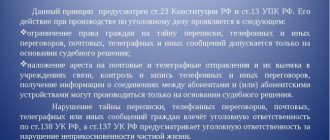ST 138 of the Criminal Code of the Russian Federation.
1. Violation of the confidentiality of correspondence, telephone conversations, postal, telegraph or other messages of citizens - shall be punishable by a fine in the amount of up to eighty thousand rubles or in the amount of the wages or other income of the convicted person for a period of up to six months, or by compulsory labor for a period of up to three hundred and sixty hours, or correctional labor for up to one year.
2. The same act, committed by a person using his official position, is punishable by a fine in the amount of one hundred thousand to three hundred thousand rubles, or in the amount of the wages or other income of the convicted person for a period of one to two years, or by deprivation of the right to hold certain positions. or engage in certain activities for a term of two to five years, or compulsory labor for a term of up to four hundred eighty hours, or forced labor for a term of up to four years, or arrest for a term of up to four months, or imprisonment for a term of up to four years.
3. Lost power.
Commentary to Art. 138 Criminal Code
1. The subject of the crime provided for in Part 1 is, firstly, information contained in correspondence, telephone conversations, postal, telegraph and other (for example, fax) messages, and, secondly, general information about telephone calls made by a person negotiations made by postal, telegraph and other communications (for example, mobile call records).
2. The objective side of the crime is characterized by access and familiarization with information contained in correspondence, telephone conversations, postal, telegraph and other messages, or with information about a person’s correspondence and messages, committed in violation of the procedure established by law. Illegal correspondence is not protected by law. The volume of information received and its subsequent dissemination do not affect the qualification of the crime.
3. A qualified crime (Part 2) involves the commission of an act by a person using his official position (such persons may be recognized, for example, as officials of bodies carrying out operational investigative activities; employees of telecom operators, etc.).
Definition of invasion of privacy
Before reading the articles of the Criminal Code of the Russian Federation, you should understand the basic principles of private life, which are as follows:
- Private life. Guaranteeing the preservation of various information about a person’s life that is not in the public domain;
- The ability to select information that can be disseminated and which should remain secret;
- A guarantee of non-interference in personal life not only from the state, but also from third parties;
- Prohibition on the collection, distribution or use of personal information without obtaining the consent of the individual;
- Providing assistance from law enforcement agencies and bringing violators to justice when invading privacy.
We can conclude that any collection of information about you, which is carried out by third parties using special equipment, is illegal. Moreover, if the collected data was distributed without obtaining your consent.
Second commentary to Art. 138 of the Criminal Code of the Russian Federation
1. The object of the crime is enshrined in Part 2 of Art. 23 of the Constitution of the Russian Federation, the right of citizens to the privacy of correspondence, telephone conversations, postal, telegraph and other messages.
2. The objective side of the crime provided for in Part 1 of Art. 138 of the Criminal Code, consists of familiarizing with postal, telegraph and radio correspondence or other communications of citizens (without their consent), listening to telephone conversations, as well as disclosing the content of such correspondence, negotiations and messages. In accordance with Part 2 of Art. 23 of the Constitution of the Russian Federation, restriction of the right to privacy of correspondence, telephone conversations, postal, telegraph and other messages is allowed only on the basis of a court decision.
The crime is considered completed from the moment the actions specified in the disposition of Article 138 of the Criminal Code are committed.
3. The subject of a crime under Part 1 of Art. 138 of the Criminal Code is a private person who has reached the age of 16 years.
4. The subjective side is characterized by direct intent.
5. Part 2 art. 138 of the Criminal Code provides for liability for this crime committed by a person using his official position.
Secrecy of correspondence, salary and home: The Plenum of the Supreme Court protected the constitutional rights of citizens
The judge-rapporteur for the project, Petr Kondratov, explained the need for its adoption by the fact that the consideration of such criminal cases raises in the courts “a significant number of difficult questions that need clarification.” However, explanations are not given for all articles of Chapter 19 of the Criminal Code. According to the judge, this is due to the fact that the Plenum has already given its explanations before regarding the application of a number of articles.
It is symbolic that the discussion is taking place on the eve of the 25th anniversary of the Constitution, said Artem Anikanov, deputy chairman of the Saratov Regional Court. According to him, the Plenum of the Supreme Court for the first time addressed “the most complex articles of the Criminal Code” on privacy. And according to Yuri Pudovochkin, a member of the scientific advisory council at the Supreme Court, the resolution under discussion is significantly different from many others: it is intended to shape judicial practice, and not just generalize it.
“The project consists of 25 points, which can be divided into two blocks: the first is the criminal legal protection of citizens’ rights to privacy, the second is the protection of citizens’ labor rights,” Kondratov explained.
Confidentiality of correspondence and negotiations with a lawyer
The Plenum of the Supreme Court protected the secrecy of correspondence and negotiations with a lawyer.
The Plenum of the Supreme Court recalled that personal and family secrets are information that is not subject to control by society and the state, is not illegal and is not made public by the citizen himself. In particular, the Plenum explains, information that constitutes personal or family secrets should include information about private life that was entrusted in confidence to representatives of certain professions or that became known to them through their service or work. For example, this is information communicated to a lawyer and necessary to provide professional legal assistance.
Dissemination of information about the private life of a person, as indicated by the Plenum of the Supreme Court, consists of confidential or public communication or disclosure of it to anyone and in any way - including on the Internet.
“Illegal access to the content of correspondence, negotiations, messages may consist of familiarization with the text and materials of correspondence, messages, listening to telephone conversations, sound, sign messages, copying them, recording them using various technical devices,” - from the draft resolution of the Plenum of the Supreme Court.
At the same time, the Plenum of the Supreme Court proposes to establish that liability for violation of the secrecy of correspondence occurs regardless of whether the transmitted information contained a secret. Illegal access to information about a subscriber’s incoming and outgoing calls is also considered a violation of the constitutional rights of citizens.
One of the paragraphs of the resolution contains an instruction: familiarization with the fact or content of correspondence, negotiations, messages with the voluntary consent of at least one of the persons whose secret messages they constitute does not constitute a crime. At the same time, if after such familiarization a personal or family secret was disseminated without the consent of the citizen, then the actions of the person guilty of this can be qualified as a violation of privacy under Art. 137 CC. This norm may be excluded from the draft before it is re-discussed.
One more clarification: actions related to violation of the secrecy of correspondence or negotiations can be qualified as a crime under Art. 138 of the Criminal Code only in case of direct intent.
“At the same time, additional provisions could be included in the resolution. For example, explanations on how to recognize as victims (for example, minor citizens) who cannot personally defend their rights and file an application to initiate a criminal case,” Pudovochkin suggested.
"Spy" gadgets
The Plenum of the Supreme Court gave clarifications on Art. 138.1 of the Criminal Code on so-called spy gadgets. The Plenum of the Supreme Court believes that they can also be understood as such things as a smartphone, voice recorder or video recorder - but only if they are specially modified for the purpose of secretly obtaining information. “In cases where special knowledge is required to establish whether a technical device is a special one intended for secretly obtaining information, the court must have the appropriate conclusions of a specialist or expert,” the Supreme Court explained.
- The Prosecutor General's Office wants to soften the punishment for using “spy” equipment
October 2, 14:22 - Jealous wife or spy: Russian woman faces jail time for spying on her husband
June 5, 14:52
At the same time, the mere fact of “illegal trafficking in special technical means” does not mean that the citizen is guilty of a crime: first it is necessary to prove that he was not mistaken about the actual purpose of the device and really wanted to obtain a special device for secretly obtaining information.
This article cannot qualify the actions of a person who purchased a device intended for secretly obtaining information for use for personal safety, the safety of family members, including children, the safety of property, or “for the purpose of tracking animals” and did not intend to use it as a means infringements on the constitutional rights of other citizens.
According to Pudovochkin, this clause contains a restrictive interpretation of the law, because such funds can be used for other purposes. For example, for crimes against the state. “If you use the proposed explanation, it will turn out that it is impossible to punish for such a crime,” he warned.
Inviolability of the home
“If a premises or structure does not comply with sanitary, technical and other standards, is unsuitable for habitation, is subject to demolition, is excluded from the housing stock - this cannot be a determining circumstance for not recognizing it as a home and depriving the persons actually living in it of criminal legal protection for them.” constitutional right to the inviolability of the home,” explains the Plenum. In such a situation, many other circumstances need to be taken into account. For example, study how long a person has been using this room as his home.
Housing. Or not? From the explanations of the Plenum it follows: if a premises or structure does not comply with sanitary, technical and other standards, is unsuitable for habitation, is subject to demolition, or is excluded from the housing stock, this does not mean that the premises is not a dwelling, the inviolability of which may be violated.
In this case, the following cannot be recognized as housing:
- A cellar, barn, bathhouse, garage - only if they were specially adapted and equipped for living.
- Premises in public places (for example, at train stations, in shopping centers), offices, utility rooms in organizational buildings.
- Train compartment, ship cabin, tourist tent.
- Residential premises not used for their intended purpose, but exclusively as a warehouse or workshop.
At the same time, the Plenum has not yet decided what exactly should be considered a “violation of the inviolability of the home”: simply a secret or open invasion or intrusion committed directly or with the help of technical or other means, when such means were used to violate the inviolability of the home (for example, to illegally establish bug or hidden camera). This issue will be resolved for re-discussion. According to judge-reporter Kondratov, the second of the proposed versions “corresponds to the practice and the very meaning of the term “inviolability.”
“Entering a home as a result of deception of a person living there or abuse of his trust is recognized as illegal, since in such cases the consent of the resident to the entry of other persons is not voluntary,” the Supreme Court said.
The Plenum also explained the qualifications of crimes: if the purpose of entering a home was theft, for example, then the provisions of Art. 139 of the Criminal Code “Violation of the inviolability of the home” is not included in this act. If the intent to steal arose after the entry, then the act must be qualified in conjunction with Art. 139 of the Criminal Code.
Illegal dismissal and delayed wages
Responsibility for an unreasonable refusal to hire or for the illegal dismissal of pre-retirement workers and mothers with a young child (Article 145 of the Criminal Code) occurs only in cases where the employer was guided by a “discriminatory motive,” the Plenum explained.
At the same time, the employer may incur criminal liability in cases where the employment contract with the employee was terminated on his initiative, but in the case there is evidence that the employer forced the employee to submit a resignation letter of his own free will precisely in connection with his pre-retirement age, the woman’s pregnancy or the woman has children under three years of age.
- The Plenum of the Supreme Court explained how to achieve the cancellation of a court decision that has entered into force
September 20, 11:33 - How it works: resolution of the Plenum of the Supreme Court on the rights of passengers
June 26, 11:10 - Plenum of the Supreme Council: major transactions and related-party transactions in a new way
June 26, 10:53
Criminal liability for non-payment of wages under Art. 145.1 of the Criminal Code also applies in cases where the employee worked without a contract - but in this case it is necessary to prove that the employer knew about this employee and actually allowed him to work.
The period for the formation of wage arrears is proposed to be calculated based on the terms of payment of wages established by the internal labor regulations of the organization, the collective agreement, and the employment contract. The moment from which the period of delayed payment should be calculated is the day following the established payment date.
The statute of limitations for bringing an employer to criminal liability for non-payment of wages must be counted from the time the criminal inaction ceases, that is, from the moment the debt is paid off, the accused is fired, or after the intervention of law enforcement officers. The fact of dismissal of an employee who was not paid wages does not affect the calculation of the statute of limitations for criminal prosecution of the employer, the Supreme Court emphasizes.
Another point in the clarification on non-payment of wages, in which the Plenum proposed two options, caused controversy. It concerns the qualification of the actions of an employer who does not pay wages to some employees in full and partially to others. Mikhail Barshchevsky, a government representative, said: non-payment of wages is one element of the crime, and non-payment of wages in full is another element. In his opinion, the option with different qualifications is legally correct. “Each crime must be classified independently,” he said.
“Non-payment of wages in different amounts cannot be considered as a combination of two crimes,” Yuri Pudovochkin, a member of the scientific advisory council at the Supreme Court, expressed the opposite point of view.
Reconciliation of the parties
The Supreme Court reminded: criminal cases based on these elements belong to the category of cases of private-public prosecution, which means they are not subject to mandatory termination in connection with the reconciliation of the victim with the accused. “However, if a person has committed such a crime for the first time, which is a crime of minor gravity, has reconciled with the victim and made amends for the harm caused to him, then the court has the right, based on the victim’s application, to terminate the criminal case against this person,” the draft says.
Following the discussion of the document at the Plenum, Chairman of the Supreme Council Vyacheslav Lebedev sent the draft resolution for revision.
- Maxim Varaksin
- Supreme Court of the Russian Federation
Types of invasion of privacy
Special attention should be paid to considering the types of invasion of privacy. The legislation of the Russian Federation provides for the differentiation of such crimes by type of punishment.
, 3 types of such crimes can be distinguished
- Invasion of personal affairs;
- Assigning a name or identity;
- Receipt and distribution of personal data.
Each type requires separate consideration, since liability for these violations is regulated by various articles of the Criminal Code of the Russian Federation.
Invasion of personal affairs means the collection of photo and video materials, which is carried out using hidden equipment, as well as staying on a person’s personal property without obtaining his consent. For such actions, the violator may be prosecuted under Articles 137, 138 and 139 of the Criminal Code of the Russian Federation. It is worth noting that the violator may be held accountable for the very fact of collecting information, since this is already the basis for contacting law enforcement agencies. If the information was disseminated, the offender faces more serious punishment.
Various companies order advertisements for their services and often use photographs of people, including celebrities, when preparing information materials. In order for companies not to have problems with the law, it is necessary to obtain the consent of the persons whose photographs are used in advertising materials. If consent was not obtained, then the perpetrators of the incident may be prosecuted under Article 137 of the Criminal Code of the Russian Federation.
At the moment, a huge number of organizations request personal data from clients in order to carry out their activities. For example, to place an order on the Internet, you must enter your personal and contact information, and the seller is obliged to keep the data entered by the buyer confidential and not allow it to be distributed or transferred to others. If the data is transferred to other persons and you start receiving calls on your mobile phone or sending letters to your email address with intrusive advertising, then this is grounds for contacting the police. An organization that transfers your data without obtaining consent will be held accountable.





